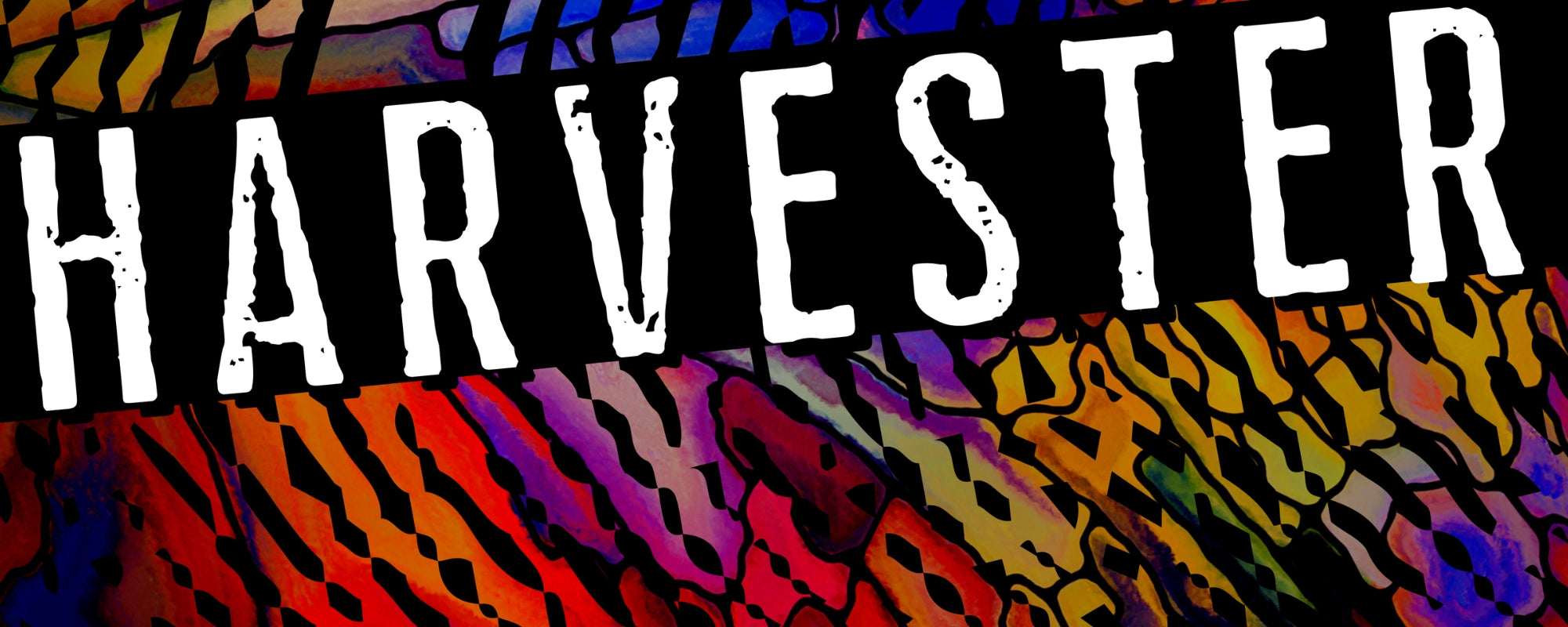

Harvester
By Andrew F. Sullivan
Whenever he was summoned, Alomar Hawser wore his favorite western shirt to the meeting, the one with the golden cactuses on the sleeves and a circle of vultures on the back. The collar had claws at the button clasp, bright yellow snaps against the pale green cotton. He wanted his clients to understand he wasn’t too serious. He didn’t like to pretend like the other contractors in his business did, their black tactical gear attempting to conceal a general inability to function in broader society. Most had washed out of policing programs or discovered they couldn’t be trusted with a firearm. Instead, they found work hunting down what the rich wanted most—delicacies unavailable by traditional means, even with the extended reach of e-commerce.
“You come heavily recommended,” Mr. Hest said, leaning back in a leather chair that had seen better days. The massive office was full of these sentimental touches. A carved wooden toucan sitting on a steel bookcase, the rug on the floor a shredded relic from student housing. Mr. Hest had money. He didn’t need you to know that; it simply emanated from his existence. His words carried the weight of his bank account. His penthouse suite in the center of the city underlined his unspoken influence. No helicopter pad though. The man had some discretion. When Alomar had arrived via the elevator, no one stopped him for identification. They saw him coming from miles away. The world’s order was premeditated up here.
“Well, I don’t think you invited me for a dressing down,” Alomar said, watching Mr. Hest raise sandy eyebrows. “Would be a waste of your time and mine.”
“Very true. I suspect we both have schedules to keep. Cages of our own making and all that. I’ll make it clear, Mr. Hawser. You have a track record for getting people what they need. No matter the weather or the season. And I have a need. A very specific one.”
Alomar tented his hands before he spoke. “All my clients do. Specific to the person or the dream?”
There were common dreams you could collect. Alomar had occasionally harvested his own when low on cash or when eying yet another bolero vest he couldn’t quite afford at the time. Teeth falling out in the middle of the night, showing up nude to a public event, imagining you could fly—all of these were fairly standard. Still difficult to procure if you hadn’t practiced harvesting, still deadly if you weren’t careful while removing the fruit, but straightforward enough. You could pull them out and provide your client with the taste they craved: the sweet pungent juice of an endless hallway vision that clung to your tongue for hours, the starchy comfort of a pet elephant fantasy, the treacle drip of a real disappearing penis nightmare. The tastes of the rich were often odd, but they paid well, and they paid on time. You didn’t fight over the bill when the purchase was illegal. You either paid up or you killed the harvester to cover your tracks. That was one of the risks Alomar had come to accept. He carried a little color-coded matrix in his head, outlining every risk and opportunity inherent to the job.
“Specific to the person,” Mr. Hest said. “I can provide you with the information.”
Often it was a family member, a child who had escaped the family’s clutches, or an elder on the verge of death. Sometimes it was a celebrity. Alomar always reserved the right to walk away from any contract he did not believe was safe. He had watched the souls of harvesters shocked right out of their bodies by hired security for pop stars and major league athletes. After the burning stopped, all that remained was ash. Not the worst way to go, but Alomar wasn’t done living yet. When he was, there would always be a building somewhere to jump off. Opportunity was everywhere.
“You’ll have to give it to me here,” Alomar said, adjusting his collar against the sweat gathering on his neck. “I don’t do electronic communications.”
“Those are the words I like to hear, my friend,” Mr. Hest said. “We have a lot in common. A nice surprise. Now this isn’t a rush order. I want it done the right way, not right away, you understand. And I don’t want to hear about it until it is done. You’ll be paid then.”
If he failed, no one would lose anything. Standard practice.
“Everything you need is in the envelope.”
Alomar reached out a callused hand to shake. Mr. Hest watched the hand but didn’t raise his own. His hands remained on his stomach, thumbs tapping out a beat in four-four time.
“We’re done here.”
Alomar smiled, bowed, and escorted himself out of the penthouse suite. He took the wooden toucan with him. It would fit perfectly beside his bed at home.
🌵
The first dream Alomar harvested belonged to his mother’s old hairdresser, a woman named Shailene who spent decades dying his mother’s blonde locks black for reasons no one ever shared. Shailene lived alone in a second-floor apartment that she owned, purchased after selling her salon to a chain. The place was full of cats when Alomar entered; they followed him when he entered her bedroom, watched as he placed his thumbs upon Shailene’s temples to begin his descent.
When he told this story to people that he needed to establish trust with, whether they were clients, lovers, or even just the drunk at the end of the bar, Alomar justified his actions as an attempt to reconcile himself with the loss of his mother, to know her in ways she never allowed, to understand her as a friend rather than a son.
Shailene knew his mother better than anyone, charted her rises and falls over the years, her battles with depression, her multiple marriages, her divorces, her insistence on driving a bright yellow Jeep in all seasons despite the lack of
utility in a major metropolitan center. She knew his mother without the shroud of familial denial that conceals bitter memories.
It sounded true, this belated reconciliation. Maybe part of it was, but the real reason Alomar descended into Shailene’s mind that night was money. His mother was dead, her assets tied up in the courts, her will so convoluted it would take months to unravel. He needed to know where she may have left the money that wasn’t mentioned, the money she never put into any bank. She was the kind who buried her life in jars. Shailene would know where they might be.
And so, Alomar gathered up his fresh gear, his pewter-tipped gloves, and the long thin wire he would slide up Shailene’s right nostril to enter her sleeping mind. He stumbled through her inner cosmos to find the dream that held his mother—a plump pungent-smelling sphere that bobbed in Shailene’s deepest subconscious. Finding the right dream was both an art and a science. You had to have the nose for it. His earlier missions were not concerned with the host surviving. There was no finesse at the black sites. Alomar stood alone as a careful practitioner there, something he brought to the private sector. Leave no trace at all.
Like a truffle pig of the cerebellum, Alomar took to the task, sorting gently through the assortment of clients Shailene had not yet banished from her head, the spicy citrus and mellow umami memories of men who took a hot shave after their trim. Down there between the raspberry tones of aging lesbians who asked for the sharpest fades she could offer, he held Shailene’s dream of his mother gently in gloved hands, careful not to break its thin membrane, aware that a single puncture could see him melted by the electric currents that sizzled between synapses, an ancient defense mechanism that had ended so many harvesting careers before they even began. A pile of ash with no owner.
Alomar emerged and ate the dream right there in Shailene’s bedroom, let the thick viscous tentacle of its juice reach down into his stomach, let the knowledge she’d kept flood into his brain. A vanilla extract stirred into raw eggs—that’s how it tasted. He would find far worse in his future, but in that bedroom, he gagged, not from the taste, but from what he had learned about the money It had been spent on cruise vacations, real estate investments, hair extensions, and the naming rights for various interstellar phenomena. The money he imagined buried under tomato plants and grape vines was gone.
He could have taken out his rage on the sleeping Shailene, battered her body until it was goo—as he had done in a different life, for a different job, that a different government would never declassify—but instead, he sighed deeply, walked out of the bedroom, chose a cat, and took it home. He named the orange beast Benadryl, and she protected his apartment from all intruders.
“What do you think, Benny? It doesn’t make sense to me.”
Alomar ran the name through databases. Saffron Carruthers.
“He says it’s not a relative…but why care then? Why pay?”
One clean harvest for the right client and Alomar wouldn’t need to work for a year. He could go on vacation if he wanted, drain his mind of sentience, immerse himself in a tank of amniotic fluid in Mexico and pretend he had never existed. That was the real dream, the one he couldn’t have these days. He wanted the ability to wipe himself out—to not exist—and then reappear again on command.
“No assets. No major connections. Nothing but a name.”
Mr. Hest’s payment would cover five years of that nothingness. All to find the dream inside Saffron’s head, the one he believed held his own name, held a secret of himself. The man wanted to taste it, the forbidden knowledge of yourself buried in someone else’s head. Men died and women were jailed for attempting to provide these delicacies. Alomar wasn’t worried about these outcomes. They all fit into his risk mitigation matrix. The opportunity overwhelmed the costs.
“It shouldn’t be too difficult once we’re in there…”
Benadryl yawned and stretched out over the igloo shaped rug on the floor. Alomar had lifted it from a singer’s bedroom, careful not to let any of the blood from her dead bodyguards get into the fabric. That woman awoke unharmed but changed. Harvesting a dream meant taking something you could never replace, like removing a non-essential organ. You were still alive but diminished. You were doomed to walk the earth with an absence inside you, and you would always know knowing something was off. For the rest of your days, the world would feel as though it had been tilted by a single degree, painfully off center.
“Don’t wait up for me,” Alomar said, gathering up his gloves and his wires. He’d upgraded his materials and methods since that first experience with Shailene, but the gloves were the same. He still liked the sound of the pewter, the tips clinking off each other like loose change. There were some harvesters who used silver, others preferred gold. A lot of the new jacks liked to use titanium, but they kept showing up dead before they could finish their harvests, the cause of death recorded as electrocution when you dug up the paperwork. It didn’t matter what you used if you didn’t know how to get out of the mind alive. They were greedy. Pewter was here to stay for now. He clacked the fingertips again. Alomar trusted very few things beyond his gloves.
“Food’s in your bowl.”
Maybe just the cat.
🌵
Saffron Carruthers lived in a massive complex down by the lake, a structure that looked impressive from a distance but decrepit the closer you got to its smeared glass doors. According to Alomar’s research, she worked as a barista in a tower downtown, cranking out espressos and London Fogs and flat whites for eight to ten hours a day, while spending her evenings trying to finish a business marketing degree that appeared to be a scam from a local community college which had recently switched to a for-profit business model. Part of him wanted to leave her a note to drop out of the program, but that wasn’t part of the job. He did not collect bad credit scores. Alomar only extracted the nightmares they could spawn.
He arrived at her door at 3 a.m. with his gear stowed in an insulated pizza delivery bag. No one ever questioned pizza. The lock was easy—a couple simple pokes at the tumblers before it clicked, and he slid the door aside. A tiny space, barely more than a studio apartment. The kitchen was a stack of take-out boxes and old bowls crusted with cereal. The floor was covered in loose cat litter. The cat watched him but didn’t hiss. Animals trusted Alomar. They knew he didn’t want anything from them. Their dreams were worthless on the open market.
Saffron slept on top of the bed’s comforter, still wearing her street clothes, too exhausted to change. Alomar waded through the dirty underwear on the floor, unloaded his pizza bag on the dresser. The thin copper wire slid easily enough inside her nose. Once it met some resistance, he plugged himself in. The pewter tips of his gloves clacked at her temples as her eyes rolled open, white and empty. Alomar closed his own and the descent began.
It was a sparse landscape. Floating forests and sodden beaches stretched out around him in undulating waves. The currents of her brain sparked and crackled around him. He dodged their limp defensive maneuvers, headed toward the bundle of fruit at her core. Mr. Hest’s prey wasn’t too difficult to find down here. The majority of the dreams bobbing around him gave off a smoky aroma, like plums and ham left to age for months beneath the earth, a savory, sickly sweetness under the smoke. Alomar tried to focus on the task at hand, but still he wondered. What could Mr. Hest want from someone who had so little.
There were no family ties, no hidden adoptions, no abortions. As far as Alomar could see, with all the resources at his disposal, there was no obvious link between the two. And yet, here he was, grabbing the dream of Mr. Hest, the one that featured him as the star, the one Alomar almost expected not to find, a pulsing sphere of salt, spiky in his hands as he grabbed it. He could feel its rough edges attempting to eat through his gloves, looking for purchase. There wasn’t much nuance to its scent, simply an overwhelming salinity that could ruin your palate for the evening.
A great crack of electricity flashed. Perhaps just the rush of Saffron’s brain processing its loss, or maybe it was some other disturbance outside her head. Maybe the cat had betrayed him after all. Despite not knowing the reason for the high alert, he risked the pain of an uncontrolled retreat and rushed his exit. He did not want to burn, not in here, not yet.
His senses burned as he rose back out of her brain. He knew the headaches would last for weeks, but he had been given no choice. Let them take him on the street if they had to, not in a water-stained one-bedroom covered in cat dander.
“Old man must be double dipping,” a voice said as Alomar snapped back into his body. He couldn’t even pull the wire out before the other man was on him, a confident chokehold around his throat. The salty dream, a gray distended sac, plopped onto the comforter. Saffron remained unconscious with the wire buried in her skull. Alomar didn’t hesitate. He threw his body back against the bigger man and drove him into the dresser behind them. He felt the wind rush out of his assailant as the chokehold released. Alomar spun around to face the man and drove his pewter-tipped thumbs straight through the man’s eyes, barely conscious of the viscera. He held the man’s face in his hands until the body stopped shaking, a scent of excrement filling the room.
“A shame,” Alomar said, letting the body drop from his hands. Some clients couldn’t be trusted. They’d hire as many harvesters as they could to get what they wanted, then let God sort them out. But a contract was a contract in Alomar’s mind. He wiped the viscera from his hands and collected his materials. The dead harvester on the floor would be good enough for the cops. They had statistics to keep down. Make it easy for them.
Alomar held the gray dream sac in his palm, trying to discern its contents. It held within it a muddled interaction—part memory, part fable—a retelling of the same order repeated, ignored, repeated again, and then remade. A monster towering over the counter, gruff lips spitting acrid smoke into the air so that the whole sac was suffused with its thick displeasure. Such a small, simple little bundle. This was what Mr. Hest required? Alomar couldn’t pretend to know why.
“Apologies,” he said to the sleeping woman, the cooper wire sliding smoothly out of her nose. She would wake up to a mess. She would wake up screaming. They all did.
On his way out of the apartment, with his insulated pizza bag now heavy with its cargo, he snagged the least dirty bowl he could find. It had a yellow smiley face at the bottom. A sign of encouragement for the picky eater. Benadryl could use a bowl like that.
🌵
They sent him up to the roof this time. A straight elevator shot with a single destination.
“I always know when someone is thinking of me,” Mr. Hest said. “You leave impressions behind. Usually, it’s just steps in the snow. They dissipate quickly. Maybe mud for the ones you trigger. They linger a little while. If you’re unlucky, someone you come across might have a brain like wet concrete. Then they remember you forever, in any way they want, entirely without your consent, your permission. And I can’t have that. No, I can’t have that at all.”
Cold air. Alomar wore his vulture and cactus shirt. Let the old man think it was the only one he owned. It didn’t matter. The money would be more than enough to make up for any ridicule a client could throw at him. It was better not to remember things, better to drift inside a vat of amniotic fluid instead of inside someone else’s brain, or even inside his own. He wrapped his arms around his chest and shivered. It was going to rain. The same tremors that let him navigate minds without fear warned him about the weather.
“So, she was wet concrete?”
“The wettest. I hope you didn’t hurt her.”
Alomar shrugged. “That’s not really my job. They’ll always know something is wrong. They just don’t know what. Her apartment is a mess though.”
Mr. Hest raised an eyebrow. “Your competition, I assume.”
“You flatter him. More like an obstacle. Do you have my money?”
“Of course. It’s right here in the bag,” Mr. Hest said, motioning to a duffel bag at his feet. It was weather-beaten and frayed along the straps—an appropriate vessel for the transaction. “But first, I need a taste of what I’m buying.”
Alomar didn’t like to watch his clients eat, but sometimes they demanded confirmation.
“Out here?”
“No better place,” Mr. Hest said, holding out a perfect, unblemished hand. Alomar plopped the gray, spiked sac into the older man’s palm. It weighed close to an ounce.
“This is all there was?”
Alomar nodded.
“It’s light, but still too much,” Mr. Hest said. “I don’t like sharing myself with others, even just a bit.”
“So, you don’t even know her? This is just a stranger’s random memory of you?”
“I demand full knowledge,” Mr. Hest said. “Maybe one day you
will understand.”
A barista misinterprets your drink order. Your reaction, a single moment of vitriol, sputtering and cursing over the counter, becomes indelibly imprinted on her mind. It wasn’t hard to see inside the sac, the little remnant Saffron once clung to, unknowingly and without purpose. It was harder to comprehend Mr. Hest’s urge to eat it, to annihilate that version of himself for good.
“Maybe.”
Alomar watched Mr. Hest push the sac up to his mouth, veneers breaking through the membrane to release the thick albumen inside. The man sucked it down easily. He was an experienced dream-eater, one who had completed this feast hundreds, maybe thousands of times. Novices struggled with the texture, sometimes coughed it up right there in front of Alomar—as they should. It was not a natural instinct to swallow some version of yourself, to let it play across your tongue, invade the crevices between your teeth, dangle from the back of your throat.
“Slurrrgh…”
Mr. Hest’s eyes went wide. This dream was not what he expected.
“Hurrrrggh…”
Much like his mother, Alomar was not big on forgiveness. The other harvester’s chokehold had left a dark purple bruise across his throat, one he covered with a jaunty pumpkin-themed ascot that matched his vulture shirt. Inside Saffron’s pithy, insignificant nightmare about her former customer, Alomar had placed a tiny dream of his own, one where he throttled a desk clerk to death on a mission no one ever remembered, in a country that no longer existed. A basement job, the kind that got shredded into a thousand little fragments. A little black spot. A real death. A death worse than his mother’s, worse than the eyeless harvester’s in Saffron’s room. A living nightmare.
“A bonus,” Alomar said, watching Mr. Hest’s body tremble. “My leftovers.”
He waited until Mr. Hest was done shaking and frothing before he pushed the body off the roof. He was too high up to hear it hit the ground. Alomar took the endless stairs down to the streets with the heavy bag of cash strapped to his back, feeling the burn in his thighs and a smile gathering at the corners of his lips. Alomar didn’t fight it. It had been a long time since he used those muscles. He grabbed an emerald umbrella from the lobby on his way out.
Copyright © 2023 Andrew F. Sullivan
The Author

Andrew F. Sullivan

Get Author Updates
Promotions, new products and sales. Directly to your inbox.


